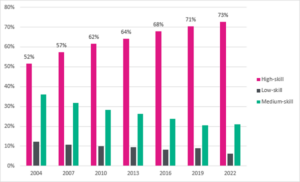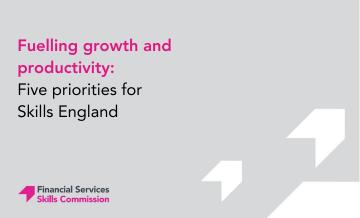CEO Blog - Where Have All the Women Gone in Financial Services? The Slow Leak in the Pipeline of Female Talent

Blog by Claire Tunley, Chief Executive of the Financial Services Skills Commission
It’s over half a century since the equal pay act, and almost seven years since the introduction of gender pay gap reporting, so one would think that gender equality within Financial Services is within arm’s reach, right?
Yet, despite firms making progress and promoting women to senior positions and boards, the statistics reveal a concerning trend: the overall number of women working in the industry has been steadily dwindling over the last two decades.
Government data makes a sobering read: from women comprising 51% of the sector’s workforce in 2004, to just 43% in 2023, albeit slightly better from the 42% low in 2022.This translates to a staggering 100,000 fewer women in the sector compared to 2004.
So, what’s the story behind this decline? According to the Financial Services Skills Commission the reason for this is due in part, to the gradual elimination of low and medium-skilled roles, like administration, sales, customer service, and clerical positions—roles predominantly held by women. It appears the industry has unwittingly drained a crucial wellspring of talent just when we need it most.
Financial Services boasts some of the most demanding roles in our economy, with almost 75 per cent requiring a high level of skill and expertise such as tech and analyst roles, predominantly occupied by men. Despite a nominal increase in women occupying highly skilled roles over the past 20 years, their representation remains stagnant, with men continuing to hold two-thirds of these positions.

This stagnation isn’t just a diversity issue; it’s a ticking time bomb for the sector’s skillset. Financial services rank among the sectors with the highest skills gaps, trailing only behind hotels and restaurants. A staggering 16 per cent of employees lack full proficiency in their roles, and the demand for skills continues to outstrip supply. With competition for top talent intensifying, it’s imperative that we rebuild the pipeline of female talent, equipping women with the critical skills needed for the future and fostering environments where they thrive.
At a recent roundtable exploring this issue, Dame Julie Mellor, former chair of the Equal Opportunities Commission characterised the issues women were facing 20 years ago as pay gaps at senior levels, pregnancy discrimination and harassment. Whilst progress has been made, many women today still struggle with workplace challenges including expectations on balancing caring demands – for children, elderly relatives for example, confidence in and recognition of their abilities to support progression, support to return to work after a break, and ongoing, deep-seated prejudice.
Many firms are taking proactive action, but to turn the tide and secure the skills we urgently need, firms must do more to
- Demonstrate how supporting female talent positively impacts on the bottom line. This isn’t a ‘nice to have’.
- Invest in upskilling and reskilling existing talent, tailoring programs specifically to empower women for future critical roles.
- Foster collaborative efforts to cultivate a pipeline of female talent equipped with technical expertise.
- Prioritise inclusion and support, addressing issues such as the menopause transition to retain female talent in the sector.
This isn’t just a female issue. Men are crucial to positive action. Being an ally, taking positive steps to call out micro acts of prejudice, reinforcing women’s position and authority and taking steps to understand women’s issues such as menopause transition – it’s time to put the men in menopause!
We are pleased to be working with the City of London Corporation on an upcoming project, to address the underrepresentation of women working in digital and highly skilled roles and take action to future-proof the digital workforce and boost the female talent pipeline. This work will bring together business, government, third sector, and industry representatives.
As we celebrate International Women’s Day, it’s time for us all to act decisively, not just for the sake of gender equality, but for the resilience and vitality of the Financial Services sector as a whole.





